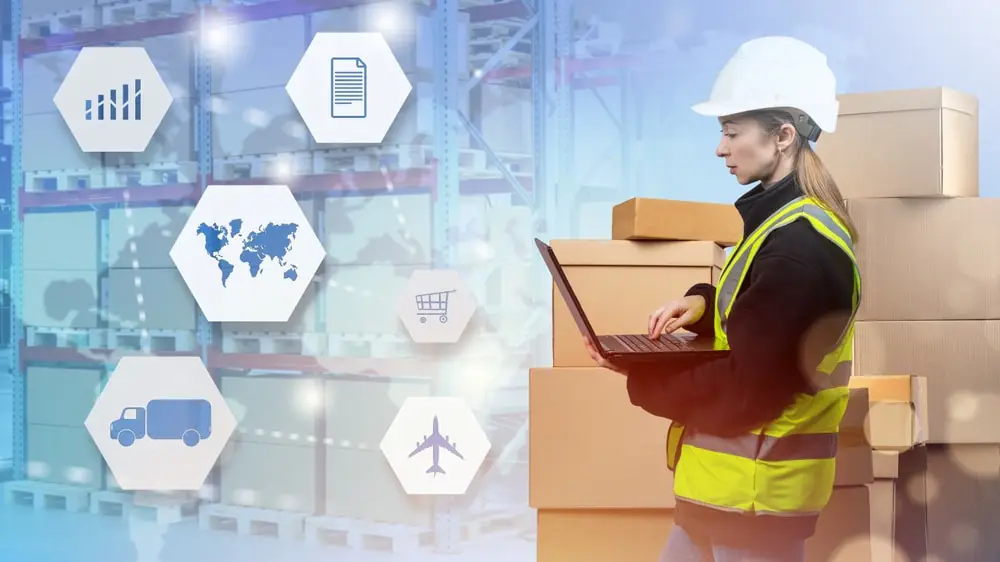
In the fast-paced world of supply chains, efficiency is king. A logistics management system (LMS) serves as a critical nerve center, coordinating everything from inventory tracking to delivery routes. How can businesses leverage an LMS to enhance their operational logistics and stay ahead of the curve? This article breaks down the features of an efficient system, illustrating how it can reduce costs and improve customer satisfaction, providing essential insights for those looking to optimize their logistical operations.
Key Takeaways
- Logistics Management Systems (LMS) elevate supply chain efficiency by optimizing various processes, including inventory management, warehouse operations, and transportation, which streamlines product delivery and boosts customer satisfaction.
- Implementing an LMS can lead to significant operational benefits such as a substantial increase in efficiency, reduction in operational costs, and enhanced customer service through real-time tracking and efficient return processes.
- Choosing the right LMS is vital for businesses and involves assessing vendor offerings, prioritizing essential features, and considering integration with current systems to adapt to business needs and technological advancements.
Understanding Logistics Management Systems
Logistics is the backbone of any thriving business, ensuring that products move seamlessly from production lines to customers. Logistics Management Systems (LMS) coordinate every aspect of this process, from inventory management to final delivery. They optimize both forward and reverse logistics within a digital environment, enhancing customer experiences and meeting consumer demands for quick product delivery. By focusing on operational efficiency without compromising profit margins, LMS empowers businesses to remain competitive in the global market.
The Core of LMS: Inventory Management
At the core of any warehouse management software lies the inventory management system, a sophisticated module that automates inventory control and strikes the perfect balance between replenishment and excess stock. By leveraging advanced tracking technologies like barcodes and RFID, it keeps a vigilant eye on inventory levels, tracking every damaged, missing, or returned item with unwavering attention. Advanced algorithms help businesses anticipate product demand trends and stock accordingly, minimizing the reliance on real-time demand. Strategic demand planning ensures a smooth flow of products and anticipates market changes, ultimately enhancing productivity.
Enhancing Warehouse Operations
In warehouse operations, LMS serves as the architect of efficiency. By automating supply chain tasks, optimizing warehouse layouts, and enhancing the storage and movement of goods, it ensures that every square inch of warehouse space is used to its full potential. By integrating scanning devices and advanced technologies, an LMS improves order picking efficiency, ensuring accurate and fast sorting methods. This streamlines distribution and fulfillment functions, propelling the entire supply chain towards greater efficiency.
Revolutionizing Transportation Management
In transportation management, LMS drives fleet and freight management with strategic transport planning and multi-modal transportation options. It focuses on finding the most effective delivery routes, managing costs, and addressing freight transportation needs. Smart route planning tools and features like fleet tracking and performance monitoring ensure that goods are delivered to their destinations on time, every time. It’s not just about moving products but doing so smarter, faster, and with greater transparency.
The Advantages of Implementing a Logistics Management System
Implementing an LMS can:
- Increase operational efficiency significantly.
- Streamline supply chain processes.
- Reduce operational costs.
- Elevate customer satisfaction.
Imagine a world where every package arrives on time, every inventory level is optimal, and every customer becomes an advocate of your brand. This is the world of an effective LMS, where superior outcomes are the norm.
Streamlining Supply Chain Processes
A streamlined supply chain is the beating heart of logistics operations, and a centralized LMS is the lifeblood that keeps it healthy. With improved visibility and better oversight across the supply chain, businesses can enhance their supply chain management by:
- Spotting and rectifying errors early on.
- Automating and refining the efficiency of the order-to-delivery process.
- Integrating customer relations with inventory accuracy.
Moreover, the ability to adapt quickly to variations with real-time updates ensures that logistics operations remain unfazed by last-minute changes. It’s this fluidity and responsiveness that are essential for a supply chain to thrive in today’s ever-changing market.
Cutting Down Operational Costs
One of the most compelling reasons to adopt an LMS is the promise of reducing operational costs. By controlling inventory levels and streamlining demand and supply plans, an LMS prevents unnecessary expenses. Smart route planning cuts down on fuel consumption and traffic delays. With logistics analytics, shipping history and operational efficiency are analyzed to lower logistical expenses, making every dollar spent count.
Boosting Customer Service Levels
Beyond internal operations, an LMS excels in boosting customer service levels. Efficient delivery processes and logistics analytics enable businesses to meet customer demands precisely. A reverse logistics system ensures smooth handling of returns, maintaining supplier relationships. Real-time tracking offers transparency, building trust and satisfaction. These elevated service levels turn first-time buyers into lifelong patrons.
Key Modules of a Comprehensive Logistics Management Platform
A comprehensive LMS comprises various modules, each playing a crucial role in the supply chain. Key integrations include:
- Order management
- Transport planning
- Fleet oversight
- Analytics
These modules enhance supply chain efficiency, optimize storage space, and facilitate cost-effective distribution. With each module meticulously handling its part, the entire system functions seamlessly, driving businesses towards operational excellence.
Order Management Prowess
The strength of an LMS is evident in its order management capabilities. It manages:
- Customer support
- Payment processing
- Fraud detection
- Paperwork across the supply chain
Real-time optimization of order status and tracking ensures seamless flow from placement to delivery. Multiple payment gateways and automatic billing features enhance efficiency. Integration with CRM and inventory databases creates a unified platform, streamlining business processes and elevating order handling.
Transport Planning and Fleet Oversight
In logistics, transport planning modules optimize shipments and provide insights for enhanced fleet management. Logistics analytics offer a comprehensive view of operations, improving transportation planning and fleet efficiency. Features such as route optimization and compliance management are indispensable for fleet operations, ensuring each vehicle operates efficiently.
Insights from Logistics Analytics
Analytics guide logistics through data, transforming it into actionable insights for smarter decision-making. Shipping history, logistical costs, and delivery times are analyzed for continuous improvement. An effective LMS uses these analytics to eliminate waste, ensure quality, and reduce operational failures. Forecasting tools optimize resource allocation and procurement cycles, shaping resilient and forward-thinking strategic plans. Real-time tracking and delivery alerts provide the agility and responsiveness expected in modern logistics.
Choosing a Custom Logistics Management Solution
While custom logistics management solutions can be tailored to fit specific business needs, many businesses find value in ready-made solutions that offer robust features and scalability. Selecting the right logistics software provider ensures that the LMS grows with the business, offering a strategic asset aligned with long-term goals.
Emerging Technologies Shaping Modern Logistics Solutions
Emerging technologies like AI, blockchain, and IoT are set to reshape the logistics landscape in the future. These innovations promise to offer secure, transparent, and efficient processes, further enhancing the capabilities of logistics management systems.
Selecting the Right Logistics Management Software for Your Business
Selecting the right LMS for your business is a critical decision that hinges on evaluating vendor offerings, prioritizing must-have features, and deciding between on-premises or cloud-based solutions. Each choice impacts the system’s operation, return on investment, and the company’s ability to meet logistical challenges head-on.
Assessing Vendor Offerings
When it comes to assessing vendor offerings, businesses must weigh their operational complexity, size, and budget against the capabilities of various logistics software solutions. The market is ripe with systems designed for specific business types, from 3PL providers to e-commerce platforms, each tailored to meet unique operational needs. It’s essential to select a logistics software that not only aligns with current requirements but also has the flexibility to scale and evolve alongside the business.
Prioritizing Must-Have Features
In the pursuit of an effective logistics management system, prioritizing must-have features is paramount. A reverse logistics module, for instance, is an essential feature that deals with the intricacies of returns, ensuring goods move back to producers with efficiency. Identifying key components that fulfill core logistics processes effectively, such as production planning capabilities, is critical to an operation’s success. By focusing on crucial features, companies can ensure their logistics system is robust, responsive, and ready to meet customer demands.
Argos Software: Your Partner for Logistics Management Software
At Argos Software, we understand that optimizing your supply chain is crucial for maintaining a competitive edge in today’s market. Our comprehensive logistics management system (LMS) is designed to meet the unique needs of businesses looking to enhance operational efficiency, reduce costs, and elevate customer satisfaction. By leveraging advanced technologies and integrating seamlessly with your existing systems, Argos Software’s LMS offers robust solutions for inventory management, warehouse operations, and transportation management.
Key Benefits of Argos Software’s LMS:
- Increased Operational Efficiency: Automate and streamline logistics processes to minimize manual interventions and errors.
- Cost Reduction: Optimize inventory levels, demand planning, and transportation routes, significantly lowering operational expenses.
- Enhanced Visibility and Control: Real-time tracking and analytics provide comprehensive oversight and data-driven decision-making capabilities.
- Improved Customer Satisfaction: Ensure timely deliveries, efficient return processes, and exceptional customer service through our integrated CRM systems.
Comprehensive Features of Argos Software’s LMS:
- Inventory Management: Efficiently track and manage stock levels to prevent overstocking and stockouts.
- Order Management: Streamline order processing from placement to delivery, ensuring accuracy and speed.
- Reporting and Analytics: Gain actionable insights through detailed reports and data analysis.
- Truck Driver App: Enhance communication and coordination with drivers for better route management.
- Freight Management: Optimize freight operations and manage shipping logistics effectively.
- Dock Door Scheduling: Coordinate dock door usage to streamline loading and unloading processes.
Whether you are seeking a ready-made solution or a tailored approach to logistics management, Argos Software is here to support your journey toward supply chain excellence. Embrace the future of logistics with a system designed to grow and evolve with your business needs. Choose Argos Software and transform your logistics operations today.
Summary
To navigate the complex currents of supply chain management, a robust and responsive Logistics Management System (LMS) is essential. From enhancing inventory management and warehouse operations to revolutionizing transportation management, LMS serves as the foundation for a streamlined, cost-effective, and customer-centric supply chain. While emerging technologies like AI, blockchain, and IoT promise future enhancements, a current LMS can already provide substantial benefits. The right LMS can be the catalyst for unparalleled supply chain success. Embrace the transformation, and watch your logistics operations ascend to new heights of efficiency and excellence.
Ready to optimize your supply chain? Contact Argos Software today to learn more.
Frequently Asked Questions
What are the core benefits of a Logistics Management System (LMS)?
A Logistics Management System (LMS) offers several core benefits, including:
- Increased Operational Efficiency: Automates and streamlines logistics processes, reducing manual intervention and errors.
- Cost Reduction: Optimizes inventory levels, demand planning, and transportation routes, leading to lower operational costs.
- Enhanced Visibility and Control: Provides real-time tracking and comprehensive data analytics, allowing for better decision-making and oversight.
- Improved Customer Satisfaction: Ensures timely deliveries and efficient return processes, enhancing the overall customer experience.
- Scalability: Adapts to business growth and changing market demands, supporting long-term strategic goals.
How can a Logistics Management System improve customer satisfaction?
A Logistics Management System can improve customer satisfaction by:
- Ensuring Timely Deliveries: Optimizes transportation routes and schedules to ensure products reach customers on time.
- Providing Real-Time Tracking: Offers transparency and updates on the status of orders, allowing customers to track their deliveries.
- Streamlining Returns: Manages reverse logistics efficiently, making it easier for customers to return products.
- Enhancing Communication: Integrates with CRM systems to improve customer service interactions and support.
- Maintaining Product Availability: Manages inventory levels effectively to prevent stockouts and delays.
What are the key features to look for in an LMS?
When selecting an LMS, consider the following key features:
- Inventory Management: Advanced tracking and automated inventory control to maintain optimal stock levels.
- Warehouse Management: Automation of warehouse operations, including order picking and storage optimization.
- Transportation Management: Strategic planning and route optimization for efficient delivery.
- Real-Time Tracking: Provides updates and visibility into logistics operations.
- Analytics and Reporting: Data-driven insights for continuous improvement and informed decision-making.
- Scalability and Integration: Compatibility with existing systems and the ability to grow with your business needs.
When should a company consider outsourcing logistics to a third-party provider?
A company should consider outsourcing logistics to a third-party provider when:
- Facing Supply Chain Inefficiencies: Struggling with internal logistics management and operational bottlenecks.
- Experiencing Fluctuating Demand: Dealing with unpredictable order volumes that challenge in-house capabilities.
- Expanding into New Markets: Lacking local expertise or infrastructure in new geographic areas.
- Seeking Advanced Technologies: Needing access to cutting-edge logistics technology without the capital investment.
- Focusing on Core Competencies: Preferring to allocate resources and attention to core business functions rather than logistics.
What should businesses consider when selecting logistics management software?
When selecting logistics management software, businesses should consider:
- Vendor Offerings and Capabilities: Assess the range of features and services provided by potential vendors.
- Integration with Existing Systems: Ensure the LMS can seamlessly integrate with current ERP, CRM, and other operational systems.
- Customization and Scalability: Look for solutions that can be tailored to specific business needs and can grow with the business.
- User-Friendliness: Choose software that is easy to use and requires minimal training for staff.
- Cost and Return on Investment: Evaluate the total cost of ownership and the potential ROI from improved logistics efficiency.
- Customer Support and Service: Consider the quality and availability of vendor support services for troubleshooting and maintenance.






